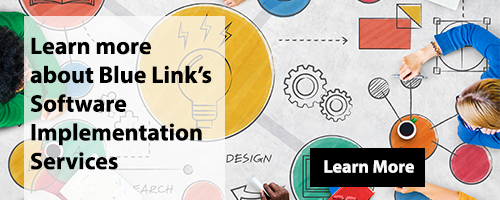Psychologists have long been preaching the importance of high emotional intelligence in great leaders. These soft traits are frequently overlooked compared to the more traditional traits associated with quality leaders – such as intelligence, toughness, determination and vision. However, some researchers such as David McClelland, argue that emotional intelligence is more important than analytical skills and that not only are they an indication of great leaders, but they are also linked to strong company performance. Great leadership plays a role in all departments of a business and can significantly impact the success of large business projects, such as the implementation of new wholesale inventory software. The right wholesale inventory software will be able to manage processes across all business departments - from inventory, accounting and warehouse operations to purchasing, sales and customer service. However, this means that the implementation process takes time and requires dedicated human resources. It is not something that will happen overnight, nor should it. Finding and implementing wholesale inventory software will be one of the biggest decisions your company makes in any given year – and is comparable to any major business purchase such as acquiring additional warehouse space or equipment. To ensure the project goes as smoothly as possible, it is best practice to assign someone within the business as the Project Manager to oversee the implementation of the new system and to drive change management within the organization. When choosing the right person for the job, consider someone who not only understands business processes across all departments but also exhibits the following traits of high emotional intelligence.
Self-Aware
Many people claim to be self-aware, but, few actually are. To be truly self-aware, one must neither be overly critical nor unrealistically hopeful – which can prove beneficial when implementing organization-wide change and in trying to get employees to adopt new wholesale inventory software. Implementing new software requires a review of processes and systems across all business departments, to spot inefficiencies and find new opportunities. There is no point denying that any big organizational change will have its fair share of ups and downs - people are resistant to change, evaluating processes takes time and energy, and requires that employees learn new skills and processes, all while still keeping on top of their day-to-day tasks. Project Managers who are self-aware will be honest with themselves and with others and they will be able to recognize how their feelings affect them, other people and their job performance. This means they are able to control their emotions during times of high stress to help put other people at ease. When employees inevitably become frustrated or stressed during the implementation, self-aware leaders can recognize where these feelings are coming from to work with employees to move forward through the transition. It is important for Project Managers to explain the benefits of the implementation and to acknowledge the roadblocks that will be encountered along the way.
Self-Regulation
Those with high emotional intelligence will be able to self-regulate – in other words, they are able to channel their emotional impulses in useful ways and are not prisoners of their feelings. This is beneficial when dealing with employees who are resistant to change – instead of becoming frustrated with a lack of co-operation during the implementation, Project Managers who can self-regulate will schedule a time to discuss the situation with the team, reiterating the benefits of the change. They will show patience with helping employees change habits and learn new skills. They will even go one step further and try to identify the underlying reasons for issues and employee resistance – looking internally to spot root causes. People who can self-regulate and are therefore in control of their emotions are seen as reasonable and as a result are able to create an environment of fairness and trust. This, in turn, leads to trust among employees that the new system will provide benefits for everyone and the company as a whole and significantly reduces any negative politics and infighting. In general, people who have mastered their emotions are able to roll with changes better and more quickly.
Motivation
People with a high degree of motivation are driven to achieve results above their own and everyone else’s expectations. They are intrinsically determined to achieve for the sake of achievement itself – as opposed to for some external reward such as an increase in salary. This translates into a love of learning, unstoppable energy to improve processes and an eagerness to find new approaches to become more efficient at work. When presented with a new challenge – such as implementing wholesale inventory software – they are driven to do whatever it takes to make the transition as smooth as possible and to design processes that allow employees to reap the full benefits of a new system. This positive attitude and energy helps to motivate other employees and increases the success of the project.
Empathy
Those Project Managers with a high degree of empathy thoughtfully consider the employee’s feelings when making decisions. This is not to say that they don’t also factor in other considerations, but they are upfront about their decision-making process and work to keep everyone informed and treated fairly. When employees feel comfortable being upfront about their concerns and frustrations, it leads to better collaboration among team members. This helps to ensure any issues are addressed as soon as possible to reduce the chances of delaying the learning and implementation process.
Social Skills
Having good social skills means more than being friendly and able to hold a conversation – it is friendliness with a purpose, allowing you to move people in the direction you desire. When looking to implement organization-wide change, it refers to the ability to get employees to adapt to change, modify existing processes, and be open to learning a new solution. People with strong social skills are expert persuaders – a key component to getting employees on board with change. If employees believe in the positive benefits of new wholesale inventory software, they are more likely to be active in its implementation and success.











